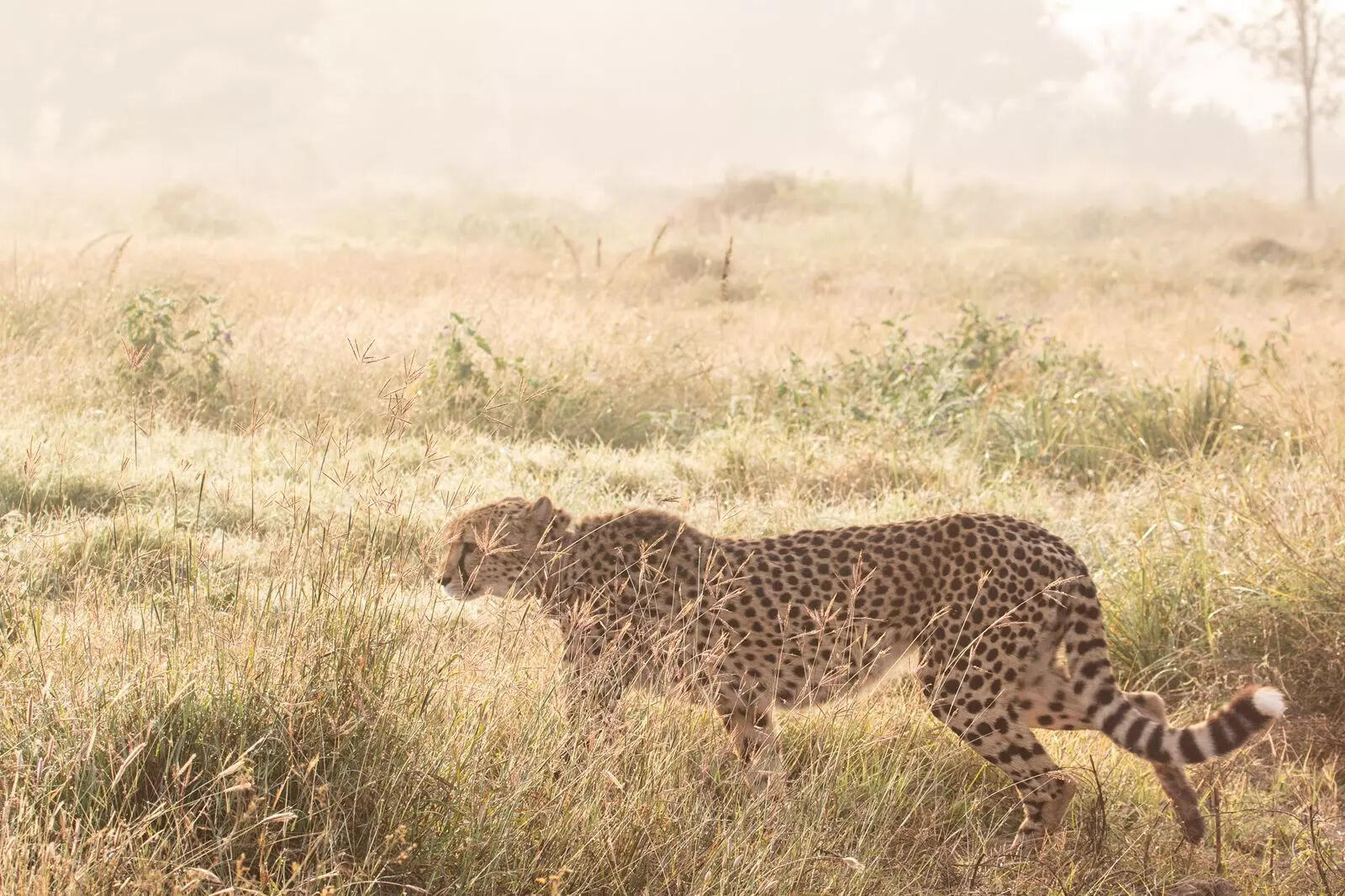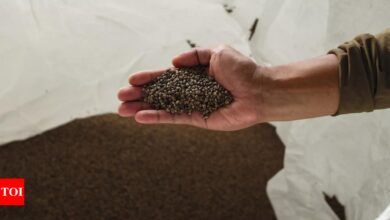India
CCF confirms health examination for cheetahs translocated to India for Project Cheetah after Sasha’s death | India News

[ad_1]
BHOPAL: A Day after Namibian Cheetah Sasha’s death inside Kuno National Park in Sheopur district of Madhya Pradesh, the Cheetah conservation fund (CCF) clarified that all cheetahs sent to India for Project Cheetah underwent extensive health examinations, including ultrasounds, blood draws, and physical observations. They had to meet specific criteria, including being wild-born, clinically healthy, and between 2.5 to 6 years old.
Sasha’s death has shocked wildlife enthusiasts and the team that has been taking care of the cheetahs and worked tirelessly to save her. An official release from the environment ministry had said that Sasha was ailing before being shifted to India.
“Sasha, had slightly elevated kidney values, but no abnormalities were found. However, she later developed kidney failure and gastritis, which are common in cheetahs under high stress”, says CCF – an international organization dedicated to saving the cheetah in the wild which played a key role in relocating eight Namibian cheetahs to Kuno for India’s Project Cheetah.
Despite receiving treatment, Sasha passed away on March 27, 2023. CCF claims that all health examination results were shared with the international team and the Namibian and Indian authorities.
Ultrasound was used to evaluate all the organs, and no abnormalities were found, including the kidneys, which had normal size and morphology/appearance (normal shape and density and structure).
“The digestive tract looked good as well. Physical observations did not show any issues: all cheetahs had good physical condition, good appetite, no sign of vomiting or diarrhoea, or undigested meat (which are commonly seen in cheetahs with gastritis). Blood values had to be within normal range: no sign of metabolic disease (normal values for blood markers for various organs), no sign of infection (normal white blood cell ranges), no sign of anaemia (red blood cells within normal range, and Blood was also screened for viral disease, said CCF.
They said, “While Sasha’s kidney values were slightly elevated (410 µmol/L, which is slightly above the upper limit of 376 µmol/L), she showed no clinical signs, had no sign of infection, and her ultrasound showed no abnormalities, therefore this was attributed to her being slightly dehydrated at the time of the examination (blood becomes more concentrated from dehydration, so values become more concentrated; but these values reduce as soon as fluids are administered). In general, Sasha had not shown clinical signs of disease while she was in Namibia. She was therefore considered to be a good candidate for translocation to India and release into the wild as part of Project Cheetah,”.
CCF added that all results for health examinations were shared with the international team involved in the Indian reintroduction, as well as the Namibian and Indian authorities.
“On arrival in India, Sasha did very well. She settled in without any health issues being noted or reported. Showed consistently good appetite and hunted successfully as soon as she got released into the camp with wild antelopes in December, requiring only one supplemental feeding prior to becoming independent,” they say.
According to CCF, In January, Sasha started to show symptoms and her health deteriorated quickly. Blood analyses showed kidney failure (creatinine of 761 µmol/L (8.61 mg/dL) which deteriorated to over 1000 within three days, which is a very fast progression and not consistent with chronic kidney failure and haemolytic anaemia. She also developed gastritis (vomiting, diarrhoea, lack of appetite, undigested meat in faeces), which is a common pathology in cheetahs that are subjected to a highly stressful situation.
The Indian veterinary team worked tirelessly to help Sasha, and the CCF veterinary team was permanently on call for the entirety of the period, assisting as much as possible. As an infectious cause was suspected, Sasha was put on antibiotics, and after several weeks of treatment showed an improvement in her anaemia as well as her demeanour: she started eating again and was let back out into the holding camp/boma.
This was a promising development as haemoglobin (a by-product of the haemolytic anaemia) is harmful for kidneys, so the hope was that the kidneys would recover as well. However, it seems that her kidneys were not able to recover from the acute kidney failure and Sasha died on the 27th of March 2023.
A necropsy was performed. Hopefully, the findings found during the necropsy itself as well as histopathology results will shed more light on the cause underlying Sasha’s rapid kidney deterioration, says CCF.
Sasha’s death has shocked wildlife enthusiasts and the team that has been taking care of the cheetahs and worked tirelessly to save her. An official release from the environment ministry had said that Sasha was ailing before being shifted to India.
“Sasha, had slightly elevated kidney values, but no abnormalities were found. However, she later developed kidney failure and gastritis, which are common in cheetahs under high stress”, says CCF – an international organization dedicated to saving the cheetah in the wild which played a key role in relocating eight Namibian cheetahs to Kuno for India’s Project Cheetah.
Despite receiving treatment, Sasha passed away on March 27, 2023. CCF claims that all health examination results were shared with the international team and the Namibian and Indian authorities.
Ultrasound was used to evaluate all the organs, and no abnormalities were found, including the kidneys, which had normal size and morphology/appearance (normal shape and density and structure).
“The digestive tract looked good as well. Physical observations did not show any issues: all cheetahs had good physical condition, good appetite, no sign of vomiting or diarrhoea, or undigested meat (which are commonly seen in cheetahs with gastritis). Blood values had to be within normal range: no sign of metabolic disease (normal values for blood markers for various organs), no sign of infection (normal white blood cell ranges), no sign of anaemia (red blood cells within normal range, and Blood was also screened for viral disease, said CCF.
They said, “While Sasha’s kidney values were slightly elevated (410 µmol/L, which is slightly above the upper limit of 376 µmol/L), she showed no clinical signs, had no sign of infection, and her ultrasound showed no abnormalities, therefore this was attributed to her being slightly dehydrated at the time of the examination (blood becomes more concentrated from dehydration, so values become more concentrated; but these values reduce as soon as fluids are administered). In general, Sasha had not shown clinical signs of disease while she was in Namibia. She was therefore considered to be a good candidate for translocation to India and release into the wild as part of Project Cheetah,”.
CCF added that all results for health examinations were shared with the international team involved in the Indian reintroduction, as well as the Namibian and Indian authorities.
“On arrival in India, Sasha did very well. She settled in without any health issues being noted or reported. Showed consistently good appetite and hunted successfully as soon as she got released into the camp with wild antelopes in December, requiring only one supplemental feeding prior to becoming independent,” they say.
According to CCF, In January, Sasha started to show symptoms and her health deteriorated quickly. Blood analyses showed kidney failure (creatinine of 761 µmol/L (8.61 mg/dL) which deteriorated to over 1000 within three days, which is a very fast progression and not consistent with chronic kidney failure and haemolytic anaemia. She also developed gastritis (vomiting, diarrhoea, lack of appetite, undigested meat in faeces), which is a common pathology in cheetahs that are subjected to a highly stressful situation.
The Indian veterinary team worked tirelessly to help Sasha, and the CCF veterinary team was permanently on call for the entirety of the period, assisting as much as possible. As an infectious cause was suspected, Sasha was put on antibiotics, and after several weeks of treatment showed an improvement in her anaemia as well as her demeanour: she started eating again and was let back out into the holding camp/boma.
This was a promising development as haemoglobin (a by-product of the haemolytic anaemia) is harmful for kidneys, so the hope was that the kidneys would recover as well. However, it seems that her kidneys were not able to recover from the acute kidney failure and Sasha died on the 27th of March 2023.
A necropsy was performed. Hopefully, the findings found during the necropsy itself as well as histopathology results will shed more light on the cause underlying Sasha’s rapid kidney deterioration, says CCF.
#CCF #confirms #health #examination #cheetahs #translocated #India #Project #Cheetah #Sashas #death #India #News






